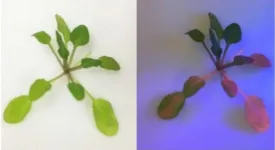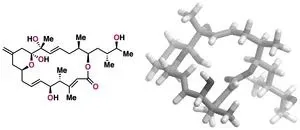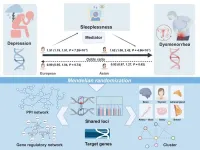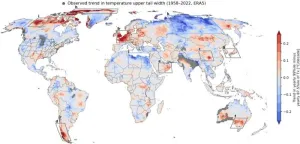Same plant, different tactic: Habitat determines response to climate
Clues found relating repair of photosynthetic protein complex to how plants survive in colder regions
2024-11-27
(Press-News.org)
Plants need light to grow, but too much light can induce damage to the photosynthetic complex known as photosystem II. It is known that plants adapted to growing under full sun repair this light-induced damage more. But this repair activity slows down in colder temperatures. An Osaka Metropolitan University-led international research team has now found some clues to how plants survive in colder regions.
Graduate School of Science Associate Professor Riichi Oguchi and colleagues from Australia, Austria, and Japan grew Arabidopsis thaliana (commonly called thale cress) using ecotypes from around the world. They were all grown at 22°C, before some were kept as a control group at that temperature and others were exposed to colder weather at 12°C for three days. The plants were then subjected to 5°C conditions in this experiment.
Damage to photosynthesis capacity by light, known as photoinhibition, is repaired at a certain rate in plants. The control Arabidopsis thaliana showed no difference among ecotypes in the rate of repair at 5°C, but the plants acclimated to the cold for three days showed an increased photoinhibition repair rate and the extent of the increase was higher in the ecotypes from colder regions.
“What we found in this experiment is that plants acclimated in cold temperatures increase their rate of photoinhibition repair in the cold, and the acclimation capacity is higher in the ecotypes from colder regions,” explained Professor Oguchi. “But during the warmer seasons, as suggested by the control group, the plants do not increase the rate as the cost of such repair capacity is high.”
###
About OMU
Established in Osaka as one of the largest public universities in Japan, Osaka Metropolitan University is committed to shaping the future of society through “Convergence of Knowledge” and the promotion of world-class research. For more research news, visit https://www.omu.ac.jp/en/ and follow us on social media: X, Facebook, Instagram, LinkedIn.
END
ELSE PRESS RELEASES FROM THIS DATE:
2024-11-27
Public health recommendations generally suggest drinking eight cups of water a day. And many people just assume it’s healthy to drink plenty of water.
Now researchers at UC San Francisco have taken a systematic look at the available evidence. They concluded that drinking enough water can help with weight loss and prevent kidney stones, as well as migraines, urinary tract infections and low blood pressure.
“For such a ubiquitous and simple intervention, the evidence hasn’t been clear and the benefits were not well-established, so we wanted to take a closer look,” said senior and corresponding author Benjamin Breyer, MD, MAS, the Taube ...
2024-11-27
Men with cardiovascular disease risk factors, including obesity, face brain health decline a decade earlier—from their mid 50s to mid 70s—than similarly affected women who are most susceptible from their mid 60s to mid 70s, suggest the findings of a long term study, published online in the Journal of Neurology Neurosurgery & Psychiatry.
The most vulnerable regions of the brain are those involved in processing auditory information, aspects of visual perception, emotional processing and memory, with ...
2024-11-27
An irregular sleep-wake cycle is associated with a heightened risk of major cardiovascular events, such as heart attack and stroke, even for those who clock up the recommended nightly hours of shut-eye, finds research published online in the Journal of Epidemiology & Community Health.
Most studies looking at the impact of sleep on health have focused on sleep length and less is known about the impact of sleep patterns, in particular the impact of irregular sleep—defined as variations in the time a person goes to sleep and wakes up.
To explore this further, the researchers drew on 72,269 people aged 40 to 79, taking part in the UK ...
2024-11-27
Women are twice as likely as men to suffer from depression and often experience more severe physical symptoms. This gender difference is particularly evident during reproductive years and dramatically impacts the lives of hundreds of millions of people worldwide. However, although links between mental health and reproductive health have been found, the associations have remained underexplored.
In a new study published in Briefings in Bioinformatics, researchers from China and the UK have found that depression can increase the chances of a person experiencing menstrual pain (dysmenorrhea).
Shuhe Liu, lead author of the study and a PhD ...
2024-11-26
PHILADELPHIA — (Nov. 26, 2024) — The Wistar Institute’s Alessandro Gardini, Ph.D., and lab have shed new light on how certain biological processes determine the development of neural cells. Their findings on a molecular “bridge” complex demonstrate a new level of detail in the understanding of early neural development — which is fundamental for the further understanding of neurodevelopmental syndromes. The new paper, “The enhancer module of integrator controls cell identity and early neural fate commitment” was published in the journal, Nature Cell Biology.
“By achieving a better understanding of how the nervous system develops ...
2024-11-26
A team of researchers led by Anna-Karin Gustavsson at Rice University has developed an innovative imaging platform that promises to improve our understanding of cellular structures at the nanoscale. This platform, called soTILT3D for single-objective tilted light sheet with 3D point spread functions (PSFs), offers significant advancements in super-resolution microscopy, enabling fast and precise 3D imaging of multiple cellular structures while the extracellular environment can be controlled and flexibly adjusted. The research was recently published in Nature Communications.
Studying ...
2024-11-26
Enron. Lehman Brothers. More recently, General Electric and Supermicro. During the past quarter century, a variety of high-profile companies have been caught cooking their books.
But they’re often not caught before they’ve cost investors billions of dollars. That’s why analysts have long tried to sniff out businesses that may be using questionable or flat-out illegal accounting tricks to hide poor performance.
New research from Urooj Khan, accounting professor and the Deloitte & Touche Centennial Faculty Fellow at Texas McCombs, proposes a new and more effective way to gauge companies’ “earnings quality.”
In analyses of corporate ...
2024-11-26
With 2024 on track to be declared the hottest on record, scientists from IIASA and Columbia University have noticed that specific regions are consistently more affected by extreme temperatures. A new study provides the first worldwide map of these regional climate danger zones.
Amid the continued upward march in average temperatures over the past decades, a recent surge of record shattering extreme heat waves raise questions about the degree to which climate models can provide adequate estimates of relations between global mean temperature changes and regional climate risks. The study just published in the Proceedings of the National Academy of Sciences (PNAS) provides the ...
2024-11-26
On Nov. 18, the heart failure and transplantation team at Emory University Hospital (EUH) made history, performing the first-ever surgical implantation in the United States of a brand-new type of ventricular assist device (VAD), which provides crucial care to patients with failing hearts.
An expert team led by veteran cardiothoracic surgeon Mani Daneshmand, MD, successfully implanted a novel magnetically levitated pump, a VAD that has been specifically designed for patient ease and long-term health. The BrioVAD System, made by BrioHealth Solutions Inc., was authorized by the FDA to begin clinical trials ...
2024-11-26
Congenital heart defects are the most common form of human birth defect, but we still don’t fully understand what causes them. Previous research had suggested that some heart defects could be triggered by problems with the placenta, the organ that provides oxygen and nutrients to the developing embryo. Now, researchers at Nanjing University, China have confirmed this link by focusing on a protein whose levels are reduced in many patients with congenital heart defects, called SLC25A1. SLC25A1 plays a key role in transporting ...
LAST 30 PRESS RELEASES:
[Press-News.org] Same plant, different tactic: Habitat determines response to climate
Clues found relating repair of photosynthetic protein complex to how plants survive in colder regions





